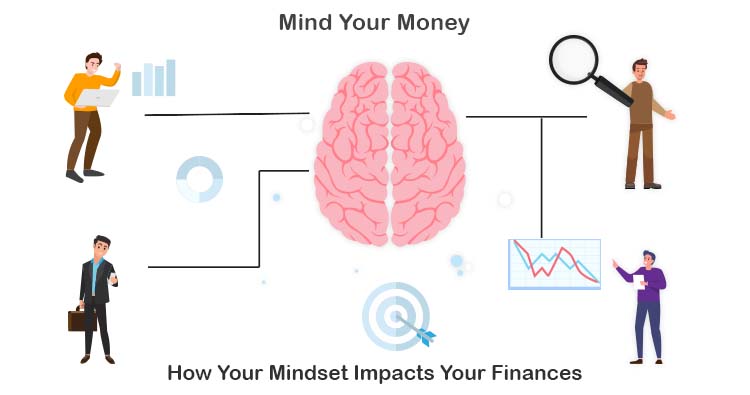- +91 9881013170
-
Certified Financial Planner®
Qualified Personal Finance Professional®
AMFI Registered-Mutual Fund Distributor

Certified Financial Planner®
Qualified Personal Finance Professional®
AMFI Registered-Mutual Fund Distributor


Mind Your Money: How Your Mindset Impacts Your Finances
Money might be a tricky topic. Want to know what makes an individual successful with their money? It's their Money Mindset. Your money mindset can affect every aspect of your financial life, from how you earn and manage money to how you feel about it.
First, let's comprehend the impact of your money mindset on your financial well-being. A positive money mindset can lead to better financial decisions, a sense of abundance, and splendid financial success. By cultivating a positive money mindset, you can improve your financial well-being and achieve your financial needs.
Let's start by reflecting on your current money mindset. Consider your financial beliefs and attitudes. When you think about money, what thoughts come to mind? Are you still hoping to take your money more seriously, maybe later in life? Or do you think winning with money is only for rich people?
If that's you, you need to improve your money mindset. Your positive relationship with money shall help you achieve greater financial success. Nobody, not your parents or your friends, can make you care. It's you who can change your mindset.
So, let's start our journey to developing a healthy and positive money mindset!
Before you develop a positive money mindset, let us understand the concept of a money mindset.
What is Money Mindset?
A money mindset refers to individuals' attitudes, beliefs, and behaviors towards money and wealth. It encompasses how individuals perceive and approach money, how they manage it, and its impact on their lives.
A healthy money mindset includes positive beliefs about money, such as seeing it as a tool for achieving one's goals and living a fulfilling life. This mindset can significantly impact how people make financial decisions, manage their finances, and ultimately achieve their financial needs. Such people hold the freedom to spend but are mindful of their spending habits and committed to achieving their financial needs.
How is your Money Mindset formed?
A money mindset is formed over time through a combination of experiences, beliefs, social conditioning, and the psychology of money itself.
Here are a few factors that indulge to the formation of your money mindset-
You can develop a healthier and more positive money mindset by understanding the factors contributing to your money mindset.
How to create a positive Money Mindset?
Here are some tips suggested to create a positive money mindset-
Creating a positive money mindset takes time and effort. By making small changes to your attitudes and behaviors towards money, you can develop a healthier relationship with money and create your desired financial future.
This blog is purely for educational purposes and not to be treated as personal advice. Mutual funds are subject to market risks, read all scheme-related documents carefully.
Flat no. 104, Bldg. No. 7,
Ved Vihar, Paud Road,
Kothrud, Pune 411038
+91 9881013170
+91 7769953077
